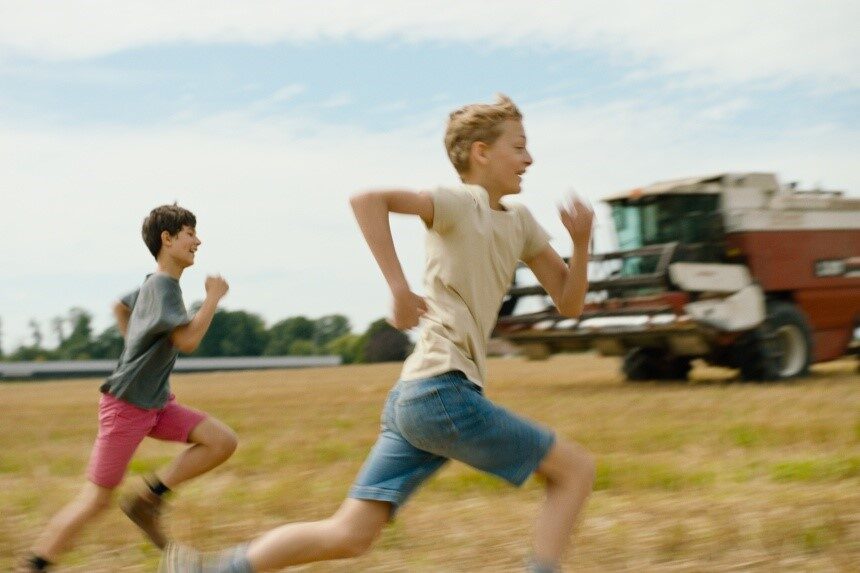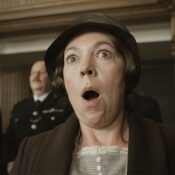Close
⭐️ ⭐️ ⭐️⭐️ ⭐️
Rating: PG-13
Run Time: 1 hour 45 minutes
Stars: Eden Dambrine, Gustav De Waele, Émilie Dequenne, Léa Drucker
Writers: Lukas Dhont, Angelo Tijssens
Director: Lukas Dhont
The Best Actor of the year is a 13-year-old kid from Belgium, a preternatural youngster starring in Close, a tragic yet hauntingly beautiful story of friendship, betrayal, guilt, and grace.
Whether or not Eden Dambrine eventually becomes an international movie star will depend, sadly, on whether or not the teen masters the English language. That’s just the way the world is.
In the meantime, in his first movie (nominated for a Best International Feature Film Oscar) Dambrine channels the trials and trauma of adolescence — displaying mastery of screen acting most veteran stars never even approach.
Dambrine plays Léo, a Belgian farm kid who is best friends with Rémi (dark-eyed and soulful Gustav De Waele). The boys are more than close; they embrace their friendship with affectionate abandon. They run to exhaustion through the local flower fields; they wrap themselves in a tangle of arms and rest their heads on each other’s shoulders; most nights involve a sleepover curling up together like puppies.
The boys’ physical comfort level seems to arise from their extraordinarily close family lives. Léo is equally at ease nestling against the chest of his older brother; he and Rémi think nothing of lying in a field with Rémi’s demonstrably loving mother (Émilie Dequenne), their heads resting on her stomach.
But the boys are in for a rude awakening when they arrive for their first day of high school. Their clear mutual affection almost immediately raises questions about their sexuality, despite the fact that it appears these two have, in their entire lives, given sex barely a second thought.
When a gaggle of girls coyly — and a bit cruelly — suggest Léo and Rémi are “together,” Léo reacts with muted revulsion. He begins to distance himself from Rémi, heading off with a new clutch of buddies and even joining an ice hockey team.
Rémi reacts not to the questions of his classmates, but to Léo’s abrupt rejection. And he does not handle it well. A bedroom wrestling match — playful at first, dead serious in the end — leads to a playground confrontation that’s as bitter as it is heartrending.
Just when it seems things cannot get any worse, they do — an unimaginable tragedy sends Close plunging into depths of drama that we, having dreaded just this outcome, had been hoping against hope we would not be asked to plumb.
Close runs just an hour and 45 minutes (a blessing in a time when filmmakers seem to consider any movie under two hours a short subject), still co-writer/director Lukas Dhont gives the film a positively languorous pace. The opening sequences, establishing the uncommon closeness of the boys, breathe with airy bliss. Even the pivotal schoolyard scenes unfold with understated deliberation. But as the implications of those tossed-off comments and barely veiled insults begin to sink in for Léo, the camera lingers on the boy’s darting blue eyes, the curious twist of his mouth. His sidelong glances toward Rémi say it all: Everything is about to change.
I can’t say precisely how long Dhont focuses his camera on his young star, but his willingness to convey so much of the film’s drama simply by filling the screen with Dambrine’s face is brave and, in the end, ingenious — only because he has found an actor up to the challenge.
From the time of silent film, the highest form of screen acting has always been that extended, wordless portrait shot; the unedited eternity during which an actor’s character undergoes transformation — a flooding wave of emotion or realization — and takes the audience along every step of the way. It’s the gold standard, and not a lot of actors are up to it. Emil Jannings’s demoted doorman crashes and burns in one shot in 1925’s The Last Laugh; Bruce Willis’s ghost hunter slowly recoils in a soul-shattering realization at the end of The Sixth Sense; Al Pacino’s Don Corleone goes from a smug thug to a sobbing scoundrel as he realizes his brother’s betrayal in The Godfather Part 2.
And here, joining that rarified rank, is Dambrine’s Léo, attending a classical music concert — listening to the music but not really — silently narrating for us every moment of his sad journey. Or standing on a school bus, hearing an adult stammer out tragic news, his widening eyes one step ahead of the halting narrative, anticipating what’s about to be said while desperately longing for the words not to come.
Close is rich in such lingering moments. Not since Franco Zeffirelli has a director been so comfortable exploring the geography of the human face, enveloping it in meaningful, often deafening, silence.
Become a Saturday Evening Post member and enjoy unlimited access. Subscribe now




Comments
It’s surprising how many parents fail to learn from the mistakes of others.
And now they’re making movies about it. Maybe that will help.
Too bad the ideas tend to be off.